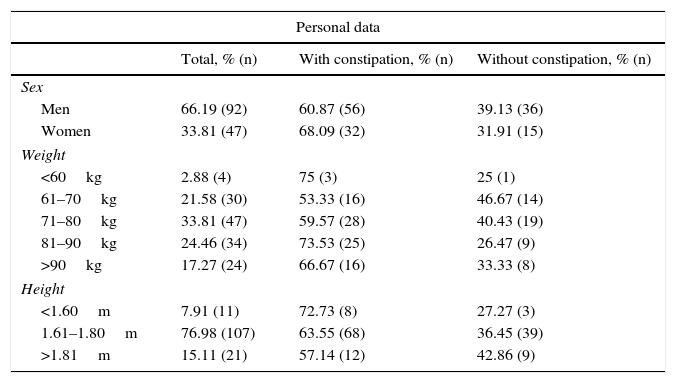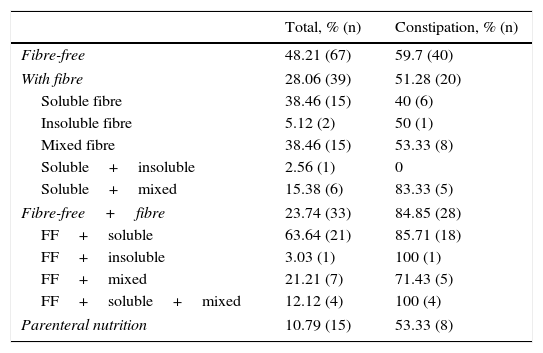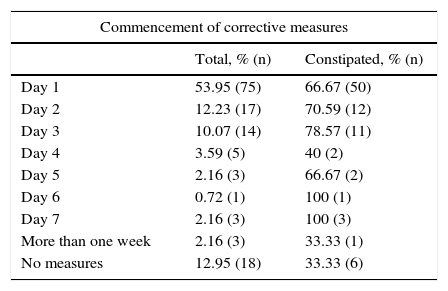To evaluate the effectiveness of nursing care against constipation and to identify, analyse and evaluate causes and consequences.
MethodologyObservational, descriptive and prospective study in polyvalent ICU tertiary hospital (2013–2015). Inclusion criteria: >18 years, stay >7 days, connected to respiratory support, with nasogastric tube and enteral or mixed nutrition. Patients with gastrointestinal pathology, encephalopathic and jejunostomy/ileostomy were excluded. The studied variables (age, sex, weight, height, pathology, medical treatment, nutrition and volume type, depositional characteristics, quantity and frequency, corrective measures and complications) were collected by ad hoc grill. It is authorised by the CEIC.
Results139 patients with a mean age of 62 years and average stay of 11 days were analysed; 63% suffered from constipation. Opiates and antacid were the drugs administered most frequently (99%), even though patients who took muscle relaxants, iron supplements and/or calcium and anti-hypertensive were the ones who suffered most from constipation (77%; 75%; 70%) The fibre free diet was the most widely used (60% constipated), followed by dietary fibre (51% constipated), and the combination of both (85% constipated). 56% used laxatives as a corrective measure, magnesium hydroxide being the most widely used; 54% began the first day. Gastric retention was the most relevant complication (49%).
ConclusionConstipation is a real multifactorial problem. We recommend:
- •
Intensified surveillance in patients with drugs that promote constipation.
- •
Use high-fibre diets from the outset.
- •
Apply laxatives and prokinetics early and in combination. We need to create a protocol for prophylaxis and management of constipation.
Valorar la eficacia de los cuidados enfermeros frente al estreñimiento e identificar, analizar y evaluar sus causas y consecuencias.
MetodologíaEstudio observacional, descriptivo y prospectivo, en UCI polivalentes de un hospital de tercer nivel (2013-2015). Criterios de inclusión: >18 años, estancia >7 días, con ventilación mecánica, portadores de sonda nasogástrica y nutrición enteral o mixta. Se excluyeron pacientes con enfermedad digestiva, encefalopáticos y con yeyunostomía/ileostomía. Las variables estudiadas (edad, sexo, peso, talla, enfermedad, tratamiento médico, tipo de nutrición y volumen, características deposicionales, cantidad y frecuencia, medidas correctoras y complicaciones) se recogieron mediante parrilla ad hoc. Dispone de autorización CEIC.
ResultadosSe analizaron 139 pacientes con edad media de 62 años y estancia media de 11 días; un 63% padecieron estreñimiento. Opiáceos y antiácidos fueron los fármacos más administrados (99%), aunque los relajantes musculares, suplementos de hierro y/o calcio y antihipertensivos fueron los que dieron más estreñimiento (77, 75 y 70%). La dieta sin fibra fue la más utilizada (60% estreñidos), seguida de dieta con fibra (51% estreñidos) y la combinación de ambas (85% estreñidos) Un 56% usó laxantes como medida correctora, siendo el hidróxido de magnesio el más utilizado; un 54% las iniciaron el primer día. La retención gástrica fue la complicación más relevante (49%).
ConclusiónEl estreñimiento es un problema real multifactorial. Recomendamos:
- •
Intensificar la vigilancia en pacientes con fármacos que favorecen el estreñimiento.
- •
Utilizar dietas con fibra desde el inicio.
- •
Aplicar de forma precoz y combinada procinéticos y laxantes. Creemos necesario crear un protocolo para la profilaxis y manejo del estreñimiento.
















